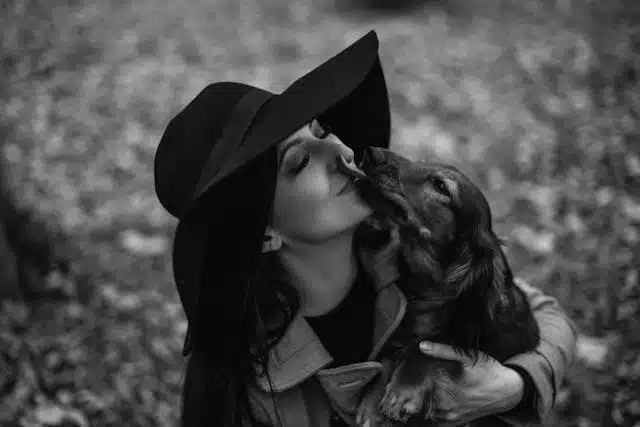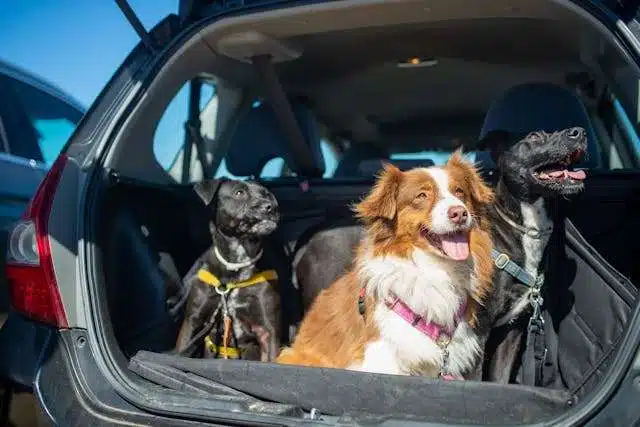I am sure that if you own a dog, you must wonder, “Why does he lick everything? ” But you should ask, “What is he licking?” In this article, we’re going to look at the most common behavioral and medical causes of why your dog is excessively licking, along with simple solutions to help.
Table of Contents
ToggleSix Behavioral Reasons Your Pup Keeps Licking Everything

1. It’s Their Doggy Instinct
The only way your dog can explore the world is through their mouths and paws since they don’t have any hands. They lick everything they want to learn about and decide whether it’s something they want to play with, chew, or eat. This is completely normal behavior, and as long as they aren’t licking anything dangerous or toxic, it’s nothing to be concerned about.
2. They’re More Than Obsessed With You
Most dogs give their owners lots of kisses, which is typically a sign of affection. Mother dogs lick their puppies, and puppies lick each other to show love, communicate, and groom each other. Dogs that lick you too much can be trained to stop doing so.
3. Your Pup’s Craving Attention
If you’re talking to, praising, or laughing at your dog while they’re licking you, this may be inadvertently teaching them that licking you is a positive way to get your attention. If you want them to stop licking you for attention, it’s time to retrain by not reinforcing it with praise and attention, and instead, not drawing attention to this behavior.
4. They’re Bored
If your dog is bored, they may lick to get your attention or entertain themselves. Make sure they have access to toys and are getting plenty of mental and physical exercise to stave off boredom. Long-lasting treats, like one of Yak Chews, are a great way to keep your pet occupied.
5. Your Dog Is Anxious
If your dog feels anxious or scared, they might obsessively lick themselves or an object to calm themselves or distract themselves. It is common for anxious licking behavior to be accompanied by other anxiety-related behaviors such as panting, pacing, trembling, hiding, whining, and lip licking. Try to identify what triggers your dog’s anxiety, like thunderstorms or being left alone. Once you know the trigger, you can work with a professional to address it. You can also help your pup relax by offering them Calm Chews. Taking these delicious supplements can help calm nerves, ease separation anxiety, and reduce stress.
6. They’re Looking For Snacks
If your dog is hungry or thirsty, they may lick their food or water bowl. If you notice them licking the floors in your kitchen, there may be some food splatter that never got cleaned up. Licking the couch? They may have found some crumbs.
Five Medical Reasons For Licking You’ll Want To Address With Your Vet

1. Your Pup Has Skin Allergies
There are several skin allergies that can cause your dog’s paws, ears, and hindquarters to become itchy, which can lead to excessive licking. It is possible that they may lick themselves so much that their fur begins to wear away. Environmental allergens or your dog’s diet can also be the culprit. Make sure you discuss allergy-sensitive diets with your veterinarian and consider allergy testing. You can also make your dog more resistant to allergies with Allergy Supplements. Your veterinarian may be able to prescribe allergy medication if your pet has severe allergies.
2. They’re Dealing With Dental Problems
If your dog licks the air, their lips, or random objects, it could be an attempt to self-soothe and a sign of pain or other problems in your dog’s mouth. Support your dog’s dental health by brushing their teeth three times a week or more, or ask your vet for recommendations for sprays or chews to support their daily dental health.
3. They’ve Got a Painful Hotspot
Hotspots are painful, inflamed red spots that form on your dog’s skin when moisture gets trapped in their fur. You might find your dog constantly licking hotspots because they are painful and itchy. Your vet can prescribe medication or treat existing hotspots, but you also need to determine whether the hotspot caused the licking or the licking caused the hotspot. When your dog continues to lick himself even after the hotspot has healed, consult with your veterinarian or an animal behaviorist to address his licking behavior so that hotspots do not recur.
4. Your Dog Is Developing Dementia
There is a possibility that dogs can develop cognitive dysfunction, which is similar to dementia or Alzheimer’s disease. This condition can lead to excessive licking. While this condition unfortunately isn’t reversible, your veterinarian can help you make a plan to slow your dog’s cognitive decline.
5. They’re Showing Signs of OCD
Your dog’s excessive licking can be an impulse behavior caused by obsessive-compulsive disorder. If you think your dog is exhibiting OCD behavior, work with your vet to rule out other possible health issues and determine the severity of your dog’s condition so you can find the right treatment option.
There is nothing wrong with licking your dog, but constant licking could indicate an underlying issue that needs to be addressed. You should bring your dog to the veterinarian for a veterinary examination to determine the reason for his licking. If needed, your veterinarian can recommend a behaviorist who can address medical causes for licking.



